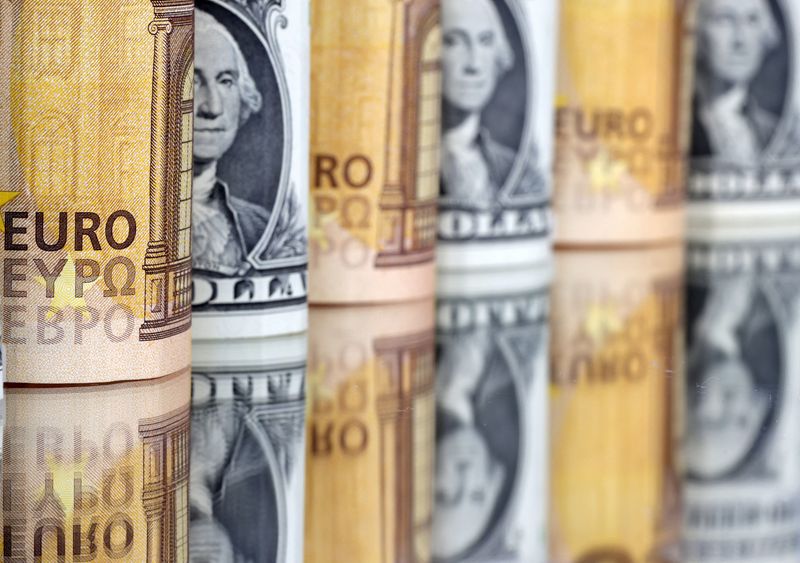By Saqib Iqbal Ahmed
NEW YORK (Reuters) - The U.S. dollar slipped to a one-week low against a basket of currencies on Monday, from the two-decade high hit last week, as traders pared bets on how aggressive the Federal Reserve would be in raising rates at its meeting later this month.
Fed officials signalled Friday they would likely stick with a 75-basis-point interest rate increase at their July 26-27 meeting, though a recent high inflation reading could still warrant larger increases than anticipated later in the year.
Traders in futures contracts tied to the Fed's short-term federal funds policy rate, who had been leaning toward a full-percentage-point rise in interest rates, shifted their bets firmly in favor of a 0.75-percentage-point increase at the upcoming meeting.
"(It's) a clear reversal of that pricing from last week after the UMich 5-year inflation expectation figure faded, and after (Fed Governor Christopher) Waller cast significant doubt on a larger hike," said Michael Brown, head of market intelligence at Caxton in London.
On Friday, the University of Michigan's preliminary survey of consumers for July showed consumers see inflation running at 2.8% over a five-year horizon, the lowest in a year and down from 3.1% in June.
On Thursday, Fed Governor Waller said he supported another 75-basis-point interest rate increase this month. This prompted a paring of bets on a 100-basis-point rate hike which had grown after a Labor Department report on Wednesday showed consumer prices rose at an annual 9.1% pace in June.
Against a basket of currencies, the dollar was 0.48% lower at 107.32. The index closed at a two-decade high of 108.65 on Thursday.
The dollar found little support from data on Monday that showed U.S. home builder sentiment plummeted in July to its lowest level since the early months of the coronavirus pandemic, as high inflation and the steepest borrowing costs in more than a decade brought customer traffic to a near standstill.
Some of Monday's dollar weakness likely reflects profit-taking after its strong rally, Caxton's Brown said.
The euro, which has come under selling pressure in recent sessions due to uncertainty about a potential energy supply crunch in the euro zone, pared gains after a Reuters report that Russia's Gazprom (MCX:GAZP) has declared force majeure on gas supplies to Europe to at least one major customer.
The euro was last up 0.68% at $1.0158.
The New Zealand dollar was 0.02% higher after an alarmingly high reading on inflation stoked speculation of more aggressive rate hikes, pushing up bond yields.
The Australian dollar, seen as a liquid proxy for risk appetite, was 0.32% higher. Commodity-linked currencies also got a boost after Chinese authorities flagged support for the property sector, lifting iron ore and copper prices

The broad weakness in the dollar helped lift the British pound 0.75% to $1.1959, but the UK currency's rally was capped by political risks and persistent recession fears in Britain.
In cryptocurrencies, bitcoin rose 4.57% to $21,876.5, extending its recovery from a weeks-long sell-off that took it below the $20,000 level.